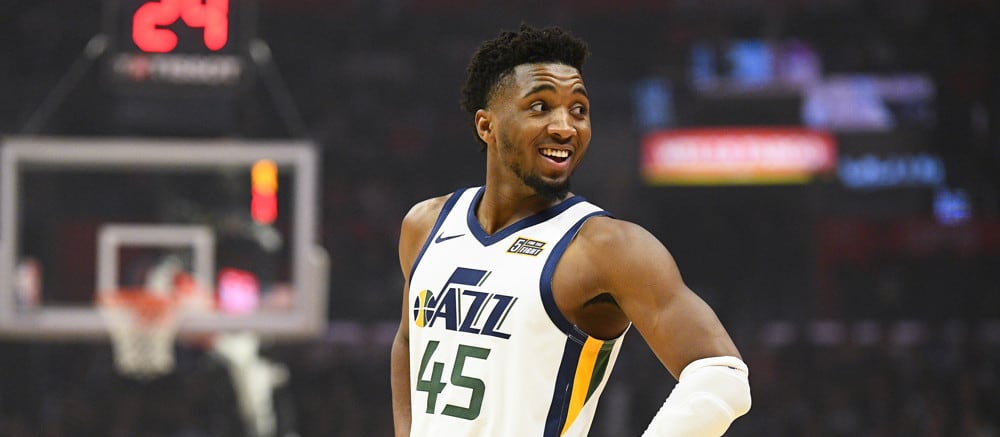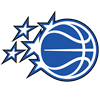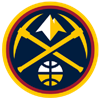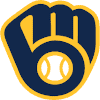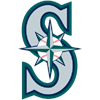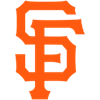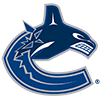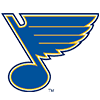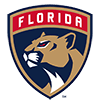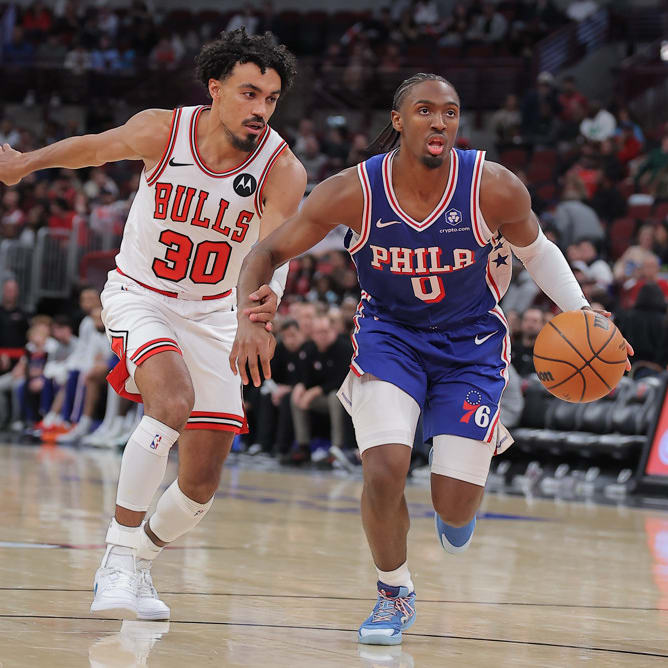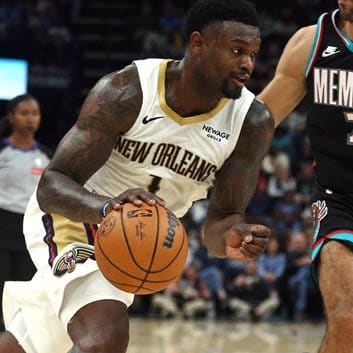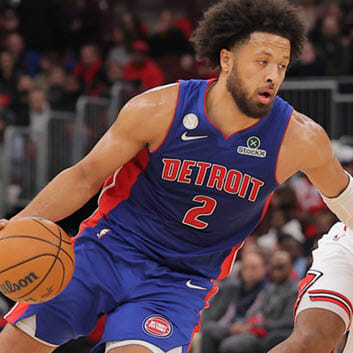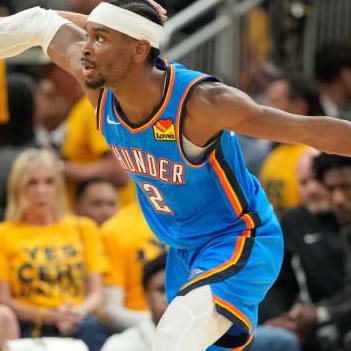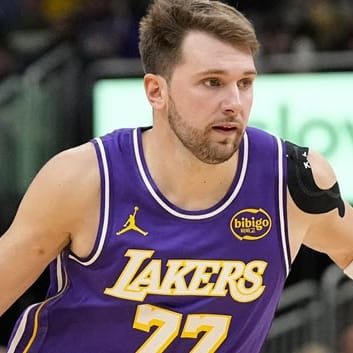Tiering is one of the most popular ways to prepare for a Fantasy basketball draft. Within each position group, separating players into tiers is an effective means of projecting general value and keeping organized during your draft. If you're in a position where you need to make a quick decision, consulting a set of tiers can help settle the debate between two players who are relatively close in value.
Entering the 2021-22 season, the NBA's talent pool is once again incredibly deep, so going into your drafts with a plan is more imperative than ever. Early on, drafting the top talents should be the priority, but as the draft progresses, it's important to be cognizant of which positions you're stocking up on and which you'll need to target in the mid-to-late rounds. Tiers can help achieve the roster balance most fantasy managers are hoping to come away with.
Here are our point guard tiers, which can serve as a general guide for those playing in standard leagues.
Tiers assume eight-category settings. Each player only appears in one set of tiers. Players are assigned to the position at which they're likely to play the most.
Tier 1
 Paul George, Clippers
Paul George, Clippers
George's numbers were good enough for a top-20 finish on a per-game basis last season. But the upcoming campaign should look distinctly different for George, who will be the unquestioned centerpiece of the Clippers' offense for most of the season while Kawhi Leonard recovers
Tiering is one of the most popular ways to prepare for a Fantasy basketball draft. Within each position group, separating players into tiers is an effective means of projecting general value and keeping organized during your draft. If you're in a position where you need to make a quick decision, consulting a set of tiers can help settle the debate between two players who are relatively close in value.
Entering the 2021-22 season, the NBA's talent pool is once again incredibly deep, so going into your drafts with a plan is more imperative than ever. Early on, drafting the top talents should be the priority, but as the draft progresses, it's important to be cognizant of which positions you're stocking up on and which you'll need to target in the mid-to-late rounds. Tiers can help achieve the roster balance most fantasy managers are hoping to come away with.
Here are our point guard tiers, which can serve as a general guide for those playing in standard leagues.
Tiers assume eight-category settings. Each player only appears in one set of tiers. Players are assigned to the position at which they're likely to play the most.
Tier 1
 Paul George, Clippers
Paul George, Clippers
George's numbers were good enough for a top-20 finish on a per-game basis last season. But the upcoming campaign should look distinctly different for George, who will be the unquestioned centerpiece of the Clippers' offense for most of the season while Kawhi Leonard recovers from ACL surgery. George proved he could handle the burden after Leonard went down in the playoffs last season, posting per-game averages of 29.6 points, 11.0 rebounds, 5.6 assists and 1.4 steals across eight contests.
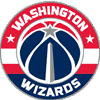 Bradley Beal, Wizards
Bradley Beal, Wizards
Beal had one of the best seasons in his career during the 2020-21 season. The 28-year-old played in his third All-Star Game and finished behind only Stephen Curry (32.0 PPG) for the scoring title. Beal's role will likely increase this season, as ball-dominant guard Russell Westbrook is no longer with the Wizards. Beal is a justifiable pick in the late-first-round after ranking in the top 13 in each of the past three seasons.
Tier 2
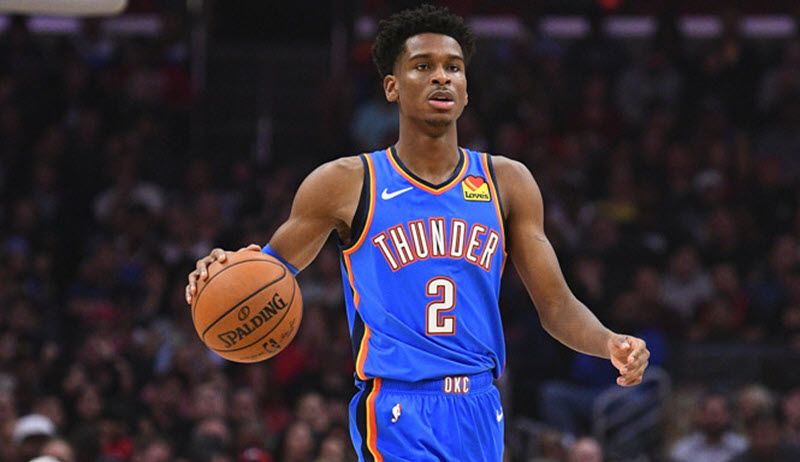
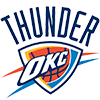 Shai Gilgeous-Alexander, Thunder
Shai Gilgeous-Alexander, Thunder
Gilgeous-Alexander appeared in just 35 games last season, as a foot injury kept him out from late-March onward. However, he was excellent when he played. The third-year guard ranked 32nd in per-game fantasy production behind 23.7 points, 5.9 assists, 4.7 rebounds and 1.5 combined steals-plus-blocks. Given the state of the Thunder as a rebuilding team, fantasy managers should have no concerns about the guard's usage.
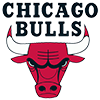 Zach LaVine, Bulls
Zach LaVine, Bulls
LaVine's steady improvement continued last season, as he ranked 16th in fantasy on a per-game basis -- the highest finish of his career. Heading into 2021-22, LaVine's usage could take a slight dip after Chicago made splashes to acquire both Lonzo Ball and DeMar DeRozan -- two players capable of taking playmaking responsibilities away from LaVine. It's still justifiable to draft LaVine in the late-second to early-third round given his potential for another season of an efficient 25-5-5. Just don't expect LaVine to take a significant step forward, despite the fact that he's entering the prime of his career.
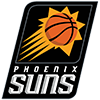 Devin Booker, Suns
Devin Booker, Suns
Last season, Booker ranked 53rd in fantasy on a per-game basis -- his lowest mark over the past four seasons. That said, Booker is in a solid position to improve upon that number. Chris Paul will be 36 years old and could be relying on 25-year-old Booker to carry even more of the offense, and Booker has playoff experience to build off of. While there's a chance he delivers another season around rank 50, Booker's high floor and potential for improvement means it's easily justifiable to draft him higher.
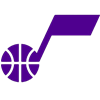 Donovan Mitchell, Jazz
Donovan Mitchell, Jazz
Last season marked Mitchell's second consecutive All-Star selection. In 33.4 minutes per game, the shooting guard averaged career highs in points (26.4), assists (5.2) and three-point percentage (38.6%). He might be surrounded by too much talent to be a 30 point-per-game player, but that also allows Mitchell the opportunity to hone in on his efficiency, playmaking and defense. Fantasy managers know exactly what they're getting out of Mitchell at this point. He has one of the highest floors of any non-All-NBA player and is an easy selection in the third round of most fantasy drafts.
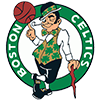 Jaylen Brown, Celtics
Jaylen Brown, Celtics
After his first All-Star season, Brown returns to the Celtics with even higher expectations. With the departure of Kemba Walker to OKC, Brown and fellow All-Star Jayson Tatum are the undisputed leaders in Boston. Walker's absence should shift additional shots and ball-handling opportunities to Brown. He has improved his points per game in each of his five seasons and shot a career-best 76.4 percent from the charity stripe last year.

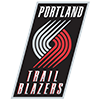 CJ McCollum, Trail Blazers
CJ McCollum, Trail Blazers
A broken foot limited McCollum to 47 games last season, but he was excellent when available. He put together his best per-game fantasy production (rank 42) since 2016-17 (29). Heading into 2021-22, fantasy managers have reason to draft McCollum marginally higher than usual. The Damian Lillard trade rumors are flying, and if he's eventually dealt, it would likely open up more usage for McCollum. Even if it's McCollum, himself, who gets traded, he could land in a spot where he's given more reign as a playmaker. And if nothing happens and the Blazers stay intact, McCollum could still be worth a fourth-round pick in most fantasy leagues.
Tier 3
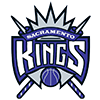 Tyrese Haliburton, Kings
Tyrese Haliburton, Kings
Haliburton turned heads in his first NBA campaign, earning a selection to the All-Rookie First Team on the strength of 13.0 points, 5.3 assists, 3.0 rebounds, 2.1 three-pointers and 1.3 steals per contest. He was an efficient shooter, knocking down 47.2 percent of his field-goal tries (including 40.9 percent of his attempts from three-point range) and 85.7 percent of his shots from the charity stripe. Despite the mini-logjam at guard with De'Aaron Fox, Buddy Hield and rookie Davion Mitchell, there's no doubt that Haliburton will be entrusted with more responsibility in his sophomore campaign.
 Buddy Hield, Kings
Buddy Hield, Kings
Hield's production took a slight step back in 2020-21, but he still made the second-most threes (282) in the NBA at a 39.1 percent clip. Heading into 2021-22, Hield will remain an elite three-point threat, but his role is somewhat in jeopardy. Tyrese Haliburton's emergence puts pressure on Hield, and the aforementioned Mitchell -- a far superior defender -- could eat into Hield's workload. There have been rumors that Hield is on the trading block, but unless something actually comes to fruition before the season, drafting Hield carries some risk.
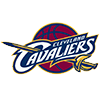 Collin Sexton, Cavaliers
Collin Sexton, Cavaliers
Sexton is coming off a 2020-21 season in which he continued to improve in most stat categories, and he ranked 74th in per-game fantasy production. His 24.3 points per game were good for 18th in the NBA. While it's possible Sexton's stats remain stagnant with the improved team around him, that could also come with improved efficiency. Ultimately, the 22-year-old seems is an appropriate mid-round pick.

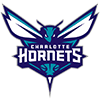 Terry Rozier, Hornets
Terry Rozier, Hornets
Despite LaMelo Ball's impressive debut, Rozier actually managed to increase his usage last season and was one of the biggest fantasy surprises. Rozier posted career highs in points (20.4), assists (4.2) and steals (1.3) per game, in addition to field-goal percentage (45.0%). Heading into 2021-22, Rozier's role shouldn't change. Devonte' Graham was shipped to New Orleans, and while Charlotte brought in Kelly Oubre and James Bouknight, the team has a myriad of lineup combinations to employ.
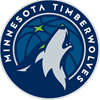 Anthony Edwards, Timberwolves
Anthony Edwards, Timberwolves
The Rookie of the Year runner-up, Edwards had a mostly encouraging debut season in Minnesota. He started off slowly, but during Edwards' final 32 appearances, he averaged 23.3 points on 45/34/76 shooting, 5.4 rebounds, 3.5 assists and 2.1 combined steals-plus-blocks. If fantasy managers can put aside his worryingly inefficient start to his rookie season, Edwards profiles as a potential 20-point-per-game scorer on passable shooting splits.
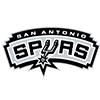 Derrick White, Spurs
Derrick White, Spurs
White might be the player who benefits the most from DeMar DeRozan's departure to the Bulls, as he suddenly finds himself in a position to be one of the alpha dogs of the Spurs' offense. He's coming off a strong 2020-21 season that saw him deliver career-best figures in both points (15.4) and three-pointers made (2.3) per game. White should be productive enough to warrant a mid-round selection, especially since he adds value with his passing (at least 3.5 APG in each of the last three seasons) and defense (combined 1.7 blocks and steals per game in 2020-21).
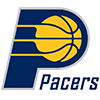 Caris LeVert, Pacers
Caris LeVert, Pacers
LeVert spent 12 games with the Nets before being dealt to the Pacers in January as part of the four-team James Harden deal. However, upon going to Indiana, his physical revealed a left kidney carcinoma. He underwent surgery to address the mass and was able to return in March. He proceeded to appear in 35 games for his new team and averaged 20.7 points, 4.9 assists, 4.5 rebounds and 1.5 steals in 32.9 minutes. Putting aside the missed games, LeVert's 2020-21 campaign was the best of his career, as he ranked 55th in fantasy in per-game production. Heading into 2021-22, LeVert should remain the Pacers' starting shooting guard and will be one of the highest-usage players on the team alongside Domantas Sabonis and Malcolm Brogdon. However, before selecting LeVert as high as the fourth or fifth round, fantasy managers should consider his extensive injury history (not including the kidney carcinoma). Injuries were much of the reason LeVert slipped to 20th overall in the 2016 NBA Draft, and he's appeared in more than 57 games just once in his career.
Tier 4
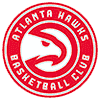 Bogdan Bogdanovic, Hawks
Bogdan Bogdanovic, Hawks
Leg injuries limited Bogdanovic to 44 games last season, but he fared well in his debut campaign with the Hawks. He played a super-sixth-man role, seeing 29.7 minutes per game and averaging career highs in points (16.4), rebounds (3.6), steals (1.1), field-goal percentage (47.3), three-point percentage (43.8%), made threes (3.3) and free-throw percentage (90.9%). Fantasy managers shouldn't expect a major change of pace for Bogdanovic in 2021-22.
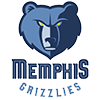 Dillon Brooks, Grizzlies
Dillon Brooks, Grizzlies
Brooks is coming off his best season as a pro, highlighted by an impressive playoff run. During the regular season, he ranked 126th in fantasy on a per-game basis through averages of 17.2 points, 2.9 rebounds, 2.3 assists and 1.2 steals. Brooks' role should remain steady in 2021-22. Fantasy managers have reason to be optimistic about his development following the Grizzlies' playoff run, so drafting him inside the top 100 is defensible.
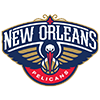 Nickeil Alexander-Walker, Pelicans
Nickeil Alexander-Walker, Pelicans
The Pelicans parted ways with both Lonzo Ball and Eric Bledsoe this offseason, so Alexander-Walker is well-positioned to take on a much larger role in his third NBA season. Across 13 starts in 2020-21, Alexander-Walker posted 19.0 points, 5.0 rebounds, 3.0 assists, 1.1 steals, 0.7 blocks and 3.1 threes per game (41.2% 3PT). While he could hurt managers in field goal and free throw percentage, the Virginia Tech product has to be on the short list of fantasy breakout candidates.
 Marcus Smart, Celtics
Marcus Smart, Celtics
With the Celtics adding Dennis Schroder in free agency in the wake of Kemba Walker's absence, it's not clear if Smart will start at point guard or shooting guard. Regardless, he should continue seeing 30+ minutes per game and will be in the mix as one of the Celtics' offensive creators. Last season, he averaged a career-high 5.7 assists per game. He's also the defense leader of the team and has averaged a combined 2.0 steals-plus-blocks for his career.
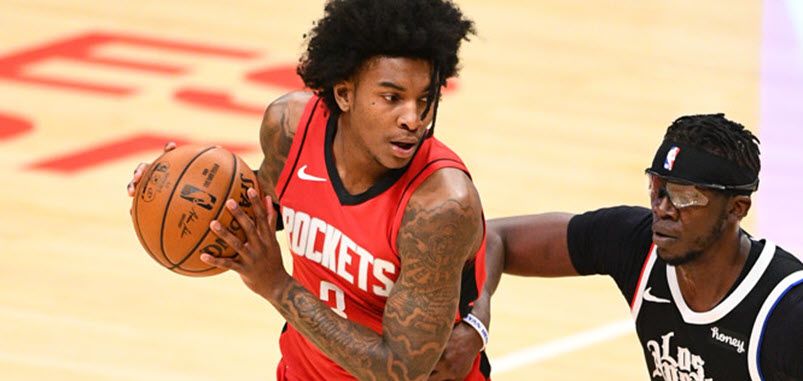
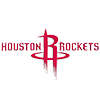 Kevin Porter, Rockets
Kevin Porter, Rockets
Upon arriving in Houston last season, Porter proceeded to appear in 26 games (23 starts), averaging 16.6 points, 6.3 assists and 3.8 rebounds. His shooting splits (43/31/73) left something to be desired, but he hasn't even reached 82 NBA games played yet. While Porter is a focal point of the rebuild, he'll still have to share touches with Christian Wood, Jalen Green and John Wall. It wouldn't be surprising to see Porter's numbers stay relatively stagnant, and the main indicator of progress will likely end up being increased efficiency.
 Jordan Clarkson, Jazz
Jordan Clarkson, Jazz
The reigning Sixth Man of the Year is coming off a career year for the Jazz. In 26.7 minutes per game, Clarkson averaged a career-best 18.4 points to go with 4.0 rebounds and 2.5 assists. As a shoot-first guard who launched 8.8 three-pointers per game, Clarkson's efficiency (42.5% FG) leaves something to be desired, but he provided just enough offense to sneak into the top 100 in eight-category leagues last season. Utah returns essentially the same roster as last season, so Clarkson's role should remain mostly unchanged.
 Malik Beasley, Timberwolves
Malik Beasley, Timberwolves
In his first full season as a member of the Timberwolves, Beasley averaged 19.6 points per game and shot 39.9 percent from three. The problem was he only played in 37 games, as a suspension and a hamstring injury kept him sidelined for 35 of the Wolves' final 39 contests. When active, Beasley is one of the league's most underrated, high-volume three-point shooters (8.7 3PA/G last season). Beasley enters 2021-22 as a projected starter on the wing alongside second-year guard Anthony Edwards. For a middling team, the Timberwolves have several mouths to feed, so it's possible Beasley could cede more shots to Karl-Anthony Towns and D'Angelo Russell, as well as Edwards, who thrived late in the season while Beasley was on the shelf.
Tier 5
 Will Barton, Nuggets
Will Barton, Nuggets
Barton has been one of the most up-and-down fantasy players on a year-to-year basis since joining the Nuggets. That's partially due to his injury history, as he's played just 157 games in the past three seasons. However, the soon-to-be 31-year-old has potential to have the best season of his career. The Nuggets will be without Jamal Murray (knee) for much of the 2021-21 season, which should put the ball in Barton's hands more often. While the Nuggets do have other playmaking options -- Monte Morris, Facundo Campazzo, Austin Rivers and even Aaron Gordon -- Barton is an excellent multi-position glue piece that can do a bit of everything offensively.
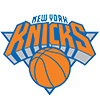 Evan Fournier, Knicks
Evan Fournier, Knicks
In August of 2021, Fournier agreed to a hefty four-year, $78 million contract with the Knicks. Fournier was cruising through another typically productive season with the Magic and was on pace to set a new career-high in points per game (19.7) before he was dealt to Boston. In 2021-22, expect Fournier to play north of 30 minutes per game, as coach Tom Thibodeau loves to give his starters extended run. The 29-year-old should receive plenty of catch-and-shoot opportunities with Kemba Walker and Julius Randle controlling most of the ball-handling.
 Kevin Huerter, Hawks
Kevin Huerter, Hawks
Heading into 2021-22, Huerter's role shouldn't change significantly, as the Hawks practically made no moves in the offseason. There's potential for him to see fewer minutes if Cam Reddish takes a real step forward, however. De'Andre Hunter will also be healthy after missing much of last season, which impedes Huerter's path toward easy playing time. Still, Huerter should be able to garner sixth-man minutes easily and provide some three-point shooting and secondary playmaking.
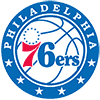 Seth Curry, 76ers
Seth Curry, 76ers
The sharpshooter is coming off his best season, ranking 150th in fantasy (per game) with averages of 12.5 points, 2.7 assists, 2.4 rebounds and most notably, 2.2 threes in 28.7 minutes. Last season marked Curry's fourth season inside the top 6 for three-point percentage (45.0), and he holds the best three-point percentage of all active players (44.4).
 Josh Hart, Pelicans
Josh Hart, Pelicans
Hart appeared in just 47 games due to a variety of injuries last season, but he put together another solid season as the Pelicans' unique sixth man. Hart has stronger real-life value as a utility player who can play upwards of four positions in certain situations. For all his flaws, the Pelicans committed a three-year, $38 million contract to him during the offseason, suggesting the organization believes in the 26-year-old's potential and that he should continue seeing minutes in the high-20s.
 Eric Bledsoe, Pelicans
Eric Bledsoe, Pelicans
After coming over from Milwaukee, Bledsoe remained a starter in New Orleans, but he saw an overall role reduction. The point guard averaged just 12.2 points, 3.8 assists and 3.4 rebounds in 29.7 minutes. He also shot a disappointing 42/34/69. The result, unsurprisingly, was Bledsoe posting his worst per-game fantasy production (rank 203) since 2011-12 (rank 327). During the 2021 offseason, Bledsoe was dealt from the Pelicans to the Clippers, where he'll likely either start at shooting guard or back up Reggie Jackson. Either way, there's a good chance he spends a lot of time with the second unit, as he wouldn't often be running the show with the starters when flanked by Jackson and Paul George. There's an opportunity for Bledsoe to have somewhat of a revival, but it's also fair to wonder if the 31-year-old is hitting a wall due to decreasing athleticism and an unreliable jumpshot.

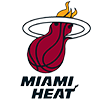 Tyler Herro, Heat
Tyler Herro, Heat
After an impressive playoff run in the bubble during the 2020 playoffs as a rookie, Herro entered last season with perhaps too much hype. While he did improve, it wasn't the leap forward that fantasy managers expected. Heading into 2021-22, there are conflicting factors when considering Herro's potential production. He's 21 years old, has stepped up in the postseason and is making improvements. But, the Heat got significantly better in the offseason -- adding Kyle Lowry, P.J. Tucker and Markieff Morris, while retaining Victor Oladipo -- meaning Herro won't need to score 15 points every night for the Heat to win. Herro is still a popular player, so there's a good chance he'll come off the board in the top 100, but that's far from a guarantee to pay off.
 Duncan Robinson, Heat
Duncan Robinson, Heat
Only two players have hit more threes than Robinson over the past two seasons (520) -- Damian Lillard (545) and Buddy Hield (553) -- but Robinson has the best percentage (42.7) of the trio. Despite Robinson doing little else on the court (though he's becoming an improved playmaker), he was able to rank 137th in per-game production last season. Heading into 2021-22, nothing should change for the 27-year-old out of Michigan
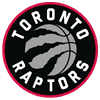 Gary Trent, Raptors
Gary Trent, Raptors
After two and a half seasons in Portland, Trent was dealt at last year's trade deadline to the Raptors. With Toronto, Trent started 15 of 17 games and posted 16.2 points, 3.6 rebounds, 1.1 steals and 2.6 made threes over 31.8 minutes per game. With Kyle Lowry moving on to Miami, the Raptors quickly decided Trent should be their new starting shooting guard and signed him to a three-year deal. With Pascal Siakam suffering from shoulder surgery and rumored to be on the trading block, there is a good chance that Trent will be forced to shoot more.
 Jalen Green, Rockets
Jalen Green, Rockets
The No. 2 pick in the 2021 Draft, Green might be the most exciting player in the class, but his game may not lend itself to strong fantasy production right away. A score-first guard with a gorgeous jumpshot, Green should launch a ton of shots and could lead all rookies in scoring, but he's not an elite passer, rebounder or defensive prospect, so when it comes to fantasy, he's on a lower tier than Cade Cunningham or even Jalen Suggs. Still, Green projects to be a strong source of points and three-pointers, and if he can chip in some assists and get to 1.0 steal per game, he could crack the top-100 in the same way Anthony Edwards did a year ago.
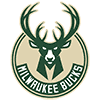 Donte DiVincenzo, Bucks
Donte DiVincenzo, Bucks
DiVincenzo stepped into a full-time starting role with the Bucks last season. The third-year guard saw 27.5 minutes per game and posted career highs nearly across the board, averaging 10.4 points, 5.8 rebounds, 3.1 assists and 1.1 steals. DiVincenzo should again start at shooting guard and see close to 30 minutes per night. He doesn't have significant competition at the position, though Pat Connaughton, Grayson Allen and George Hill will have their nights. Given Milwaukee's established offense, there isn't much room for DiVincenzo to take a massive leap forward. However, he's shown intriguing potential as a well-rounded, two-way player.
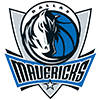 Tim Hardaway, Mavericks
Tim Hardaway, Mavericks
Hardaway played in 70 games during his second full season in Dallas, averaging 16.6 points in 28.4 minutes per game. It marked the second straight season that Hardaway shot over 39.0 percent from three. His scoring ability makes him an intriguing streaming option, but unless you catch him on a hot streak, his ancillary production may be meager.
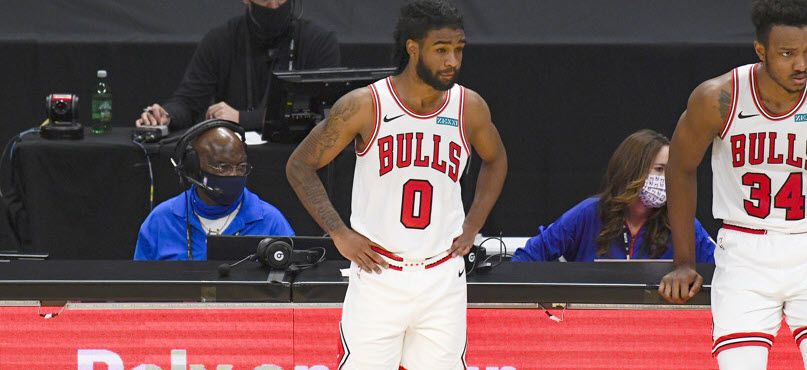
 Coby White, Bulls
Coby White, Bulls
White parlayed a strong end to his rookie campaign into a near-full-time starting role with the Bulls last season. He saw 31.2 minutes per game and averaged 15.1 points, 4.8 assists and 4.1 rebounds. White may have a difficult time building on that in 2021-22. During the offseason, the Bulls brought in Lonzo Ball and Alex Caruso, not to mention DeMar DeRozan. Plus, Zach LaVine is still around and will take up plenty of usage. There's now a wealth of guard depth in Chicago, and it's not clear where White fits in.
 Victor Oladipo, Heat
Victor Oladipo, Heat
Between stints with the Pacers, Rockets and Heat last season, Oladipo averaged 19.8 points, 4.8 rebounds, 4.6 assists and 1.4 steals in 32.7 minutes, which led to him ranking 81st in fantasy on a per-game basis. However, he appeared in just 33 games -- including just four with Miami before injuring his surgically-repaired right quad again, forcing him to undergo another surgery. Despite reports that he could be ready to go by November, the situation effectively destroyed his options in free agency. Fantasy managers should consider taking Oladipo in the final rounds of standard drafts simply due to his pedigree as a two-time All-Star who needs to prove himself this season.
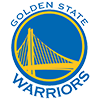 Klay Thompson, Warriors
Klay Thompson, Warriors
Thompson hasn't played over the past two seasons due to both a torn ACL and a torn Achilles. The Warriors say he should be ready by Christmas, which caps his fantasy potential but doesn't make him un-draftable. It's hard to know what to expect from the 31-year-old given his age and recent injury history. Even if he stays healthy, it wouldn't be surprising if he's aggressively rested and sits out back-to-backs. He'll likely be eased back into a starting role, so he might see minutes in the high-teens to low-20s initially. How viable it is to draft Thompson if your league is heavily dependent on how many injured reserve spots are available. If he does, indeed, make his debut on Christmas Day, he'll already have missed Golden State's first 32 games.


